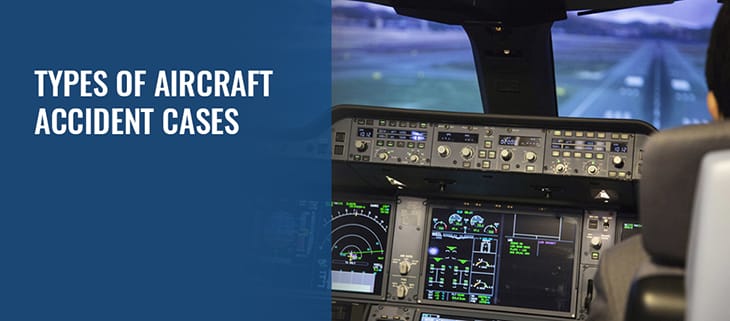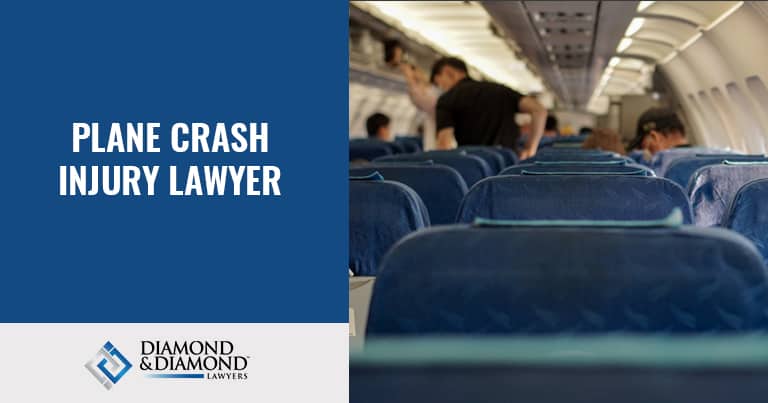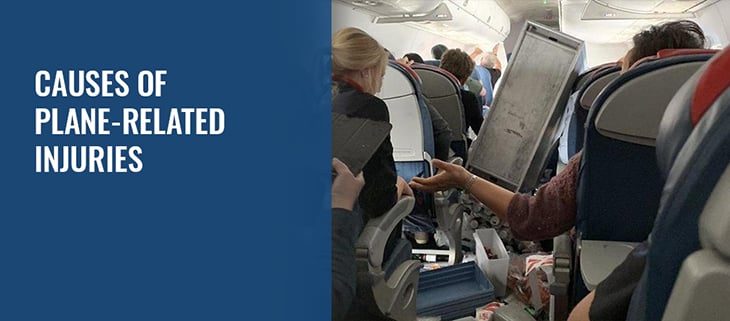For many people, airports are often chaotic. Finding your way amidst a sea of people and keeping an eye on your bags can be stressful. When delays or gate changes pile on top of this, further complications may arise.
Nevertheless, air travel becomes more and more popular every year. The airline industry has become one of the busiest in the transportation sector. Even though the number of daily flights plummeted due to COVID, the major Canadian airlines flew 213,000 customers in April.
Even with the ongoing pandemic, flying is one of the safest ways to travel, especially long haul. Airlines are operating under strict health and hygiene codes to ensure passenger safety. Still, accidents can happen. Either inside the plane or at the airport. If you or a loved one got hurt during a trip, be sure to hire an experienced personal injury lawyer to file for compensation.
We have different specialists for each type of accident or plane crash injuries:
Causes of Plane-Related Injuries
In-flight
When you’re 30,000 feet above the ground, things don’t always go according to plan. Rough weather can cause turbulence that may cause you to hit something. The cabin might suddenly decompress due to human error, lack of maintenance, or an engineering flaw.
Staff negligence can also cause injuries. A suitcase might fall from a compartment that wasn’t properly closed, or a flight attendant might hit you with the meal cart. A judge might also rule negligence if you don’t receive the plane’s basic safety instructions or if the flight is short-staffed.
Accidents before takeoff
Accidents and injuries can occur even before the landing gear leaves the ground. People are usually worried about having space for their bags and in a rush to sit down. Remember, haste is the enemy of perfection.
Boarding is not the only moment to be careful and as organized as possible. It’s also essential to remain in your seat with your seatbelt fastened while the plane is taxiing. A sudden stop might hurl you to the floor.
During Landing
Commercial planes mostly fly themselves nowadays, but takeoffs and landings still rely on the pilot’s skills. The traffic controller also plays an important role, coordinating many aircrafts at the same time. A pilot or controller error can leave passengers looking for a plane crash injury lawyer.
A mechanical problem, structural issue, or design flaw can also cause a crash. Flaps and landing gear defects can cause significant accidents. With all that said, it’s good to exercise precaution, but don’t worry too much about it. You have a slimmer chance of being in a plane crash than being hit by lightning or killed by a shark.
The Complexity of Plane-Related Accidents
Liability
Airlines are complex businesses that involve many more operations than themselves. Companies such as plane and parts manufacturers, maintenance companies, and airport management firms work in tandem to guarantee efficiency and quality. Sometimes it can be hard to determine which party is liable for an accident.
Number of victims
Minor accidents are more straightforward for all parties than a more significant plane crash injury claim. When multiple passengers are injured or die, it’s common to see class actions. These collective lawsuits can take some weight off the victims’ shoulders. Also, taking individual legal action can be quite expensive.
Class suits are perfect for larger groups of victims with smaller claims. If you win a class action, the payments are shared equally across the injured parties. So if you think the damages you suffered are significantly greater than those of the other people involved, it might be best to pursue individual action. Keep in mind that you’re prohibited from filing an individual claim later if you lose the class suit.
Jurisdiction
The Montreal Convention is an international treaty that amended the previous Warsaw Convention. It allows the victims or family of a deceased passenger to claim for injuries in the carrier’s domicile, the destination, where the contract was made, or in the passenger’s domicile. Thus, they can choose the most convenient jurisdiction with favourable laws.
Common law and each province’s fatal accident and negligence statutes determine injuries’ liability for domestic flights. While the principle is the same, some details might differ between territories. Make sure to consult an aviation lawyer.
Types of Aircraft Accident Cases

We’ve written about commercial flights so far, but the aviation laws applied to the airlines also underpin private planes. Instead of filing a suit against a company, the defendant is the owner of the aircraft. The local legislation also contemplates injuries or crashes related to helicopters or balloons.
There are industry requirements imposed to enhance safety, known as the Canadian Aviation Regulations (CARs). Military aircraft don’t need to abide by these regulations, as they’re not for civilian use. However, under the Aeronautics Act, the Ministry of Transport is responsible for supervising aeronautics matters. They may assemble a board of inquiry to investigate an aircraft accident, even a military one.
Plane crashes and aircraft-related accidents can be traumatic. Get the compensation you need if you or your loved one got hurt by calling Diamond & Diamond Alberta.
Contact an Alberta Personal Injury Lawyer from Diamond & Diamond
If you find yourself in need of a plane crash injury lawyer in Alberta, we have experienced professionals ready to help you file your claim. Call us anytime, any day, at 1-800-567-HURT. Alternatively, visit our offices in Calgary or Edmonton. We also have offices in Ontario and British Columbia. If you prefer, fill out our website’s online contact form for a free consultation.
PRO TIP:
You can file for compensation if you suffered an injury or a loss due to falling luggage dislodged from overhead bins.
FAQs on Plane Crash Injury Lawyer
Can a plane crash injury lawyer also handle skydiving accident cases?
Skydiving is an extreme sport. Most businesses will require you to sign a waiver relieving the firm of responsibility for damages. However, a judge might dismiss this document due to negligence on the part of the company. Be sure to read thoroughly before signing, as you might be forfeiting your legal recourse in case of an accident. As specialists in general personal injury claims, we at Diamond & Diamond can help you.
How long after the accident should I file a plane injury claim?
The limitation period depends on the provincial statutes. Most often, you must file the claim within two years of the accident. If the responsible party omitted the accident, the two years count from the date of discovery but have an ultimate limitation period. It’s ten years in Alberta, 15 in British Columbia and Ontario, and 30 in Manitoba.
Can a plane crash injury lawyer also handle hot air balloon accident cases?
Yes. The legislation on injuries in hot air balloons and helicopters is similar. While a bit different from planes, they all fall under the same category: aviation.
Can you sue an airline for crashing?
Yes, you can sue an airline for crashing. If you’re one of the injured victims, this process will benefit you because it will help you recover from medical bills, lost wages, and non-economic damages.
Do airlines compensate for a crash?
Yes, an airline would compensate for a crash, especially if it is at fault. They’re legally liable to pay compensation for all the damages that they incurred, like if a passenger dies or undergoes bodily injuries on board an aircraft.
How long does it take to investigate a plane crash?
It usually takes months, even years, to investigate a plane crash. Because these investigations are complex due to the severity of the case, it would be challenging to get a definitive conclusion after the incident.
Is there a time limit for filing a plane crash lawsuit?
After a plane crash, you shouldn’t feel pressured to file a lawsuit. Attend to your or your loved ones’ injuries first before focusing on the case. Usually, the maximum time given for victims to file a lawsuit is 2 years after the accident. However, this may vary depending on the province.
What are the common causes of plane crashes?
The most common causes of a plane crash include:
-pilot error (failure to make a decision, inexperience, flying a plane while under the influence)
-mechanical failure (improper repairs, no maintenance, etc.)
-weather
-other human errors (air traffic controllers, dispatchers, or maintenance engineers errors)
What damages can be compensated from a plane crash claim?
Similar to most cases involving injuries, you can be compensated for lost wages, medical expenses (hospital bills, medication, therapy, ER visits), physical pain and suffering (depends on the type of injury, length of recovery, and permanence of injury), emotional distress, loss of consortium, and punitive damages.




